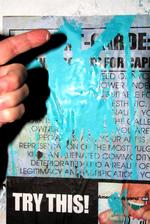As a guy with a girlfriend or a wife, you know you've found yourself in situations where, if you were to view them as a third party, you'd cringe and wonder what the hell happened to your manishness. That's the plight in which the guy in this Texas Rangers commercial finds himself. Thankfully, the campaign's tagline, "You could use some baseball," has the cure.
The campaign, created by Austin-based Door Number 3, consists of three television commercials and an outdoor effort (PDF).
If you've ever read a farming magazine, you know they're full of bland looking ads for tractors, milking equipment, barn stantions, feed mixtures, silage blowers and all sorts of other things you've never heard of. To cut through all that boring clutter John Deere (yes, the tractor people) have, with help from Yamamoto Moss Mackenzie, created some decidedly different looking ads to promote their Farm Plan accounting program.
The two ads, Disco Ball and Skateboard, are certainly not your average milk tank ad and we think we think they just might catch a bit of extra attention from your average farmer.
After stylishly offing everybody at his old agency, Chuck McBride prepares to start afresh with a new San Francisco agency. Called Cutwater, it'll mainly consist of employees and clients from TBWA's SF location. TBWA will consequently be bowing out of the SF market.
PETA posts an article on the passing of Anna Nicole Smith, comparing the organization to her influence in a way that kind of makes sense but isn't immediately obvious to the casual observer: "We always thought that Anna Nicole was a perfect fit for PETA because, just like us, she not only hated cruelty to animals but also couldn't be ignored and because, no matter what people thought of her, they always had an opinion one way or another."
Touching stuff. To solidify the comparison, both were pretty good at performing stripteases for selected audiences.
Adrants reader Chris Peterson, a principal at entertainment company Ballad Enterprises and former strategic planner for Disney, thinks he has the answers to the GAP's branding woes and offers some free advice, writing, "There's a simple solution to fixing Gap, the brand. Get rid of the celebrities and start investing in the emotional meaning of the word Gap itself. The brand name has gotten lost in the celebrity shuffle.
The feelings that rub off on the word Gap need to come from a genuine place, not from a never ending parade of celebrities. The core values of the brand need to be defined in a personal and intimate way that plays off the word itself.
Example: A teenage boy and a girl are sitting on a bench with a "gap" between them. Neither one has the courage to start a conversation, but clearly they are enamored with each other. Suddenly a no name street musician sits down between them and starts belting out a soulful ballad. Then he walks away. The two kids immediately start talking to each other.
Gap logo...Tagline: Get Together.
more »
We love a conspiracy theory as much as the next guy. That's why we're so attracted to the latest rumour about the mysterious Splasher, an entity splashing paint on street art in trendy New York neighborhoods, who suddenly appears to have an agenda.
To lend some background, the Splasher's been attacking local art through January and pasting manifestos alongside them, calling street art "fetishized [actions] of banality" and "a representation of the most vulgar kind: an alienated commodity." Readers are admonished not to remove the flyers because the paste is allegedly mixed with shards of glass.
I'm Not Sayin notes the latest batch of splashed posters coincide with the art instead of defacing it. And what's the "art" in question? American Apparel ads, of course. He then posits the Splasher is a guerilla campaign cooked up by American Apparel in order to attract (or provoke?) the attention of hipsters, artists and news outlets.
They've succeeded (if indeed it's them), though we'll throw a guess in the pool and suggest they may just be piggy-backing on an actual art-defacing, paint-happy ad-Zorro out yonder. Assuming it's all AA's doing, whether they'll be revered for cleverness or reviled for crime (which graffiti, however pretty, actually is) is another story.
Thankfully, lots of street art starts out as some kind of "defacing" appropriation of public space so we're sure they'll be sympathetic to the big brand's splattery assertion that they're all bourgeois tools.
The Child Health Foundation releases this ad to demonstrate one of the bigger cons of smoking with a very light touch. Copy reads, "Some children get to heaven earlier," and the campaign is by Serviceplan, Germany.
We're feeling a little bummed about it, and we don't even have kids. Or smoke. We wonder if we walked around with little halos on our heads like that and if mommy and daddy just chose to ignore them.
Here's something that might prove helpful for the hopefuls attending the Advertising Industry Diversity Job Fair and Leadership Conference taking place next week.
Shedwa points us to My Life in Advertising, a video podcast hosted by Sean McKenna of GSW. McKenna has a gift for portraying our industry pretty well and making it laugh-worthy too (in retrospect, that's probably not hard). Jokes aside, the show lends a decent look inside a typical agency. Apparently it's not all bloody murder.
Check My Life in Advertising out on iTunes.
There's a running Ebay sale for a Dodge Neon covered in over 1500 Pokemon cards from both the first and second generation. With a bid over $600 and seven days left running, we think the guys that did it have a decent chance of meeting their $7000 reserve, particularly if the sip and click trend keeps claiming victims.
"Just think about it," says Hypothetical Drunk Friend #1. "Can't you imagine how fucking awesome it would be to have a Pokemon car? When will we ever have this chance again?!"
"You're right!" exclaims Hypothetical Drunk Friend #2. "There's only 5 minutes left on the auction. Let's do this."
Auction end is met with hysterical giggles. Until the next morning.
Dun dun duuuuun.
It was just a matter of time before Borat got pinned a victim for his masochistic hairstyle but it turns out his case may be bigger than that, depending on whether you value the right to good hair over freedom of speech.
An annual human rights report released by Condy Rice criticizes the real Kazakhstan, listing relevant examples of human rights victims and including fictional character Borat, the woman-bashing, Jew-spooked Kazakh reporter invented by Jewish comedian Sacha Baron Cohen.
It's unsurprising Borat's come across some trouble considering the president isn't too keen on Cohen's charming rendition of Kazakhstan as racist, superstitious and misogynistic. The decision to pull Borat's website, Borat.KZ, is ceremoniously noted in the report: "The government deemed as offensive the content of a satirical site controlled by British comedian Sacha Baron Cohen and revoked the .kz domain."
We think it's sweet that the country has risen to Borat's defense. If we're going to chuck dirt at all our international friends anyway we might as well stop pretending it's for a good reason and go on righteously rallying for fictional characters.
Humbert Humbert had it rough too. Who wants to throw the rock at Mother Russia?

|











